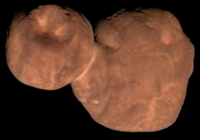
Photo from wikipedia
In the article a comprehensive study of thermotechnical and thermogravimetric properties of peat from Vladimir region of Russia for power generation was carried out. Analysis of thermotechnical data showed that… Click to show full abstract
In the article a comprehensive study of thermotechnical and thermogravimetric properties of peat from Vladimir region of Russia for power generation was carried out. Analysis of thermotechnical data showed that the samples under study of valley peat and high-moor peat are low-grade fuel and unsuitable for combustion due to high moisture and the need for preliminary drying of peat raw materials. Analysis of thermogravimetric data showed that the thermal decomposition of samples under study in an inert medium proceeds in 2 stages: evaporation of moisture and volatile yield due to the active decomposition of organic substance. At the same time, the average residual mass for valley peat is about 44%, for high-moor peat 35%; therefore, as a result of decomposition, most of the organic matter turns into a gas or liquid phase. Taking into account the obtained results, the use of peat for power generation is possible by use of various types of thermochemical conversion of peat raw materials like a pyrolysis/gasification to produce liquid, solid, and gaseous products, as well as processes for the production of solid composite fuels (briquettes). These technologies will make it possible to process low-grade fuels into peat products and thereby to expand the use of peat raw materials in power engineering.
Journal Title: Biomass Conversion and Biorefinery
Year Published: 2019
Link to full text (if available)
Share on Social Media: Sign Up to like & get
recommendations!